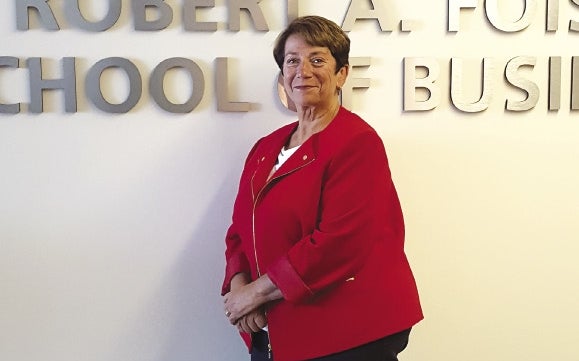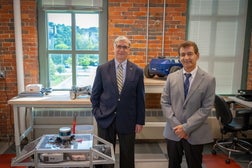WPI entrepreneur-in-residence: ”I don't like to lose.”
 Yael Schwartz
Yael Schwartz
On Aug. 1, Yael Schwartz took over as the entrepreneur-in-residence at WPI, the third since the program launched in 2014. She is the founder and CEO of Holden dermatology product startup Or-Genix Therapeutics, previously founding healthcare product makers Hygeia Therapeutics and Canterbury Laboratories.
What makes you a good entrepreneur?
I don’t like to lose. That is one of the key things about being an entrepreneur, you have to really hate losing. So, I wasn’t going to let circumstances throw me to the ground. The only reason, in my opinion, a company should fail is if the technology isn’t any good. It should never fail because you can’t raise money.
How will your experience help at WPI?
If there is a mistake to be made, I’ve made all of them. I wish I had the opportunity when I started my first company to learn from someone who had been there and done it before, but I didn’t have the opportunity accorded to me when I started my company.
What I hope to bring to WPI is someone who is experienced and has seen what can happen – the good and the bad – as you start to develop a company, the pitfalls that can occur and how you can package your technology to entice an investor to want to roll the dice with you.
Are we in an entrepreneur renaissance?
This may shock you, but despite all the talk about entrepreneurism, in the United States – I can’t speak about other countries – we are producing far fewer companies now than when did 30 years ago. That seems counterintuitive given all the talk about entrepreneurism, but that just happens to be a fact.
How could that be?
I don’t think anyone really knows because there is more than one reason. The Millennials – those are the people really posed to start companies – are graduating now with a tremendous amount of debt. They have to worry more about how they are going to pay their student loans than starting a company. Because when you start a company, you are likely to go without salary for several years until your company gets off the ground.
What is another reason?
There is less venture in venture capital than there was 30 years ago. Everybody wants a winner, and that is just not apparent in entrepreneurial companies. There is a lot of risk.
How can entrepreneurial classes help?
A business school gives people is an opportunity to see if – especially if you have entrepreneur courses – is to see if that is the right step for someone. It really isn’t for everybody.
Then who is it for?
To be an entrepreneur – and this is not something you learn – you have to have an attitude that you are not going to let the word “no” knock you down because you are going to hear “no” a lot more than you hear “yes.” If you are a person who falls apart when someone rejects you, this may not be for you.
What do you plan to do at WPI?
There is a lot of talent on campus, and I am looking forward to working with the university as a whole to identify these potential companies and help people pull together their business plan, their financial forecasts and – if they happen to be a therapeutic – how to position themselves for FDA interaction. If they're not in therapeutics, if they are in engineering – cement, for an example – that may seem a little disparate, but the principles that go into development into anything are the same. It has to be usable, and it has to fulfill an unmet need somewhere.
Any other plans for WPI?
I want to get involved in course teaching and some curriculum development to make the courses applicable to the challenges entrepreneurs are going to face.
Video













0 Comments